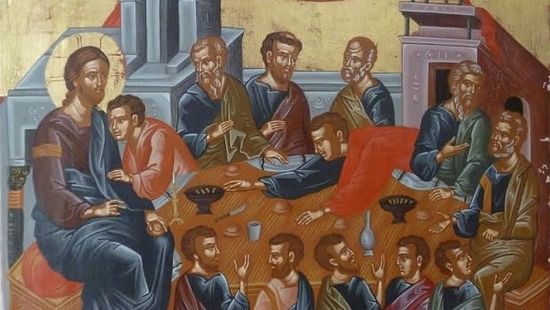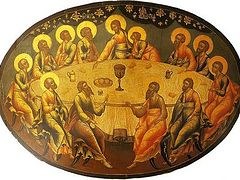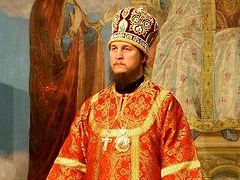Source: Orthodox Christian Network
April 28, 2016
For I received from the Lord what I also delivered to you, that the Lord Jesus on the night when he was betrayed took bread, and when he had given thanks, he broke it, and said, “This is my body which is for you. Do this in remembrance of me.” In the same way also the cup, after supper, saying, “This cup is the new covenant in my blood. Do this, as often as you drink it, in remembrance of me.” For as often as you eat this bread and drink the cup, you proclaim the Lord’s death until he comes. I Corinthians 11:23-26 (From the Epistle of the Vesperal Liturgy on Holy Thursday Morning) Holy Thursday
On Holy Thursday, we commemorate the Institution of the Eucharist. The Lord took two very ordinary things, bread and wine, and “consecrated” them to be His Body and Blood. And then He gave these two ordinary things, now “extra-ordinary”, to His Disciples, to partake of them.
In our church, we celebrate the Eucharist often. We bring the same “ordinary” gifts, bread and wine, and offer them in the service. There is nothing extraordinary about bread and wine. They can be purchased in any store. They can be made in any home. They are rather ordinary substances. But when they are brought into the church, prayed over and “consecrated,” these ordinary substances become “extraordinary.” Because they are touched by THE Holy Spirit, they become “extraordinary,” they become “holy”. Holy means “set apart”. So they become “Holy,” in the sense that they are no longer mere bread and wine, but they are THE Body and THE Blood of Jesus Christ. When we receive these “extraordinary” Gifts, we become “extraordinary” by association. Just like when you are dirty and take a shower and use a cleaning agent, soap, you become clean. So, when we touch what is extraordinary and Holy, we become extraordinary and holy. The challenge comes after we receive what is “extraordinary.” Do we leave church and act “extraordinary” and “holy” or do we revert back to being “ordinary.”
We receive Communion for many reasons. First, it is a commandment—“Take eat.” “Drink of this all of you.” “Do this in remembrance of Me.” Second, it allows God to come into us, and it affords us the opportunity to touch the Divine God.
There is a third reason which we often forget. We receive Communion in order to REMEMBER what Christ did for us. In celebrating the Liturgy, we not only partake of Christ, but we get a refresher course in what it means to be a Christian. We remember that Christ died for our sins. We remember that He was Resurrected from the dead. We remember His teachings. We remember that He came from God and returned to God, and that we can follow the same path.
In bringing ordinary gifts and making them extraordinary, we remember that WE can become extraordinary through partaking of Holy Communion. We remember that we cannot be content being ordinary because we have witnessed and partaken of the extraordinary. In receiving Communion, we remember that the Gifts are Holy, they are set apart, and in receiving the Gifts, we are to become Holy and set apart, set apart for God and His purposes for our lives.
In receiving Communion we are sustained in our lives until we meet the Lord, because we have Him in our minds, our hearts and our lives, with regularity. This is why Saint Paul intentionally chooses the word “often”, to encourage us to receive Communion on a frequent basis, so that there isn’t sufficient time to forget Christ and what He did for us.
We tell our spouses and our children often that we love them. Is that because if they don’t hear it every day that they might doubt that we love them? I suppose if they only heard it once a year, they might. But we tell people we love them often because hearing that you are loved is a great source of encouragement. It is always a positive thing.
In the Eucharist, we are reminded that God loves us, so much that He died for us. He loves us so much that He is preparing a heavenly kingdom for us. He loves us so much that He has given us a pathway to follow to get us from here to there.
In receiving the Eucharist, we tell God that we love Him. We tell Him that we want to be extraordinary and holy. So the Eucharist is not just some ritual where we bring ordinary gifts and a “show” is performed over them. The Eucharist is an opportunity to partake of the extraordinary to remind us that we are extraordinary. It is the opportunity to stand in the presence of the Divine God in this life in preparation for living with Him in the next. It is an opportunity to partake of what is holy to remind us to be holy. And it is an opportunity to remember all that God did and still does for us, so that we can go forth and live for Him.
Do this in remembrance of me. For as often as you eat this Bread and drink this Cup, you proclaim my death, and you confess my resurrection. Therefore, Master, we also, remembering His saving passion and life giving cross, His three; day burial and resurrection from the dead, His ascension into heaven, and enthronement at Your right hand, God and Father, and His glorious and awesome second coming. (From the Anaphora of the Liturgy of St. Basil, Trans. by Holy Cross Seminary Press)
Allow the Eucharist to help transform you from ordinary to extraordinary each time you receive!




